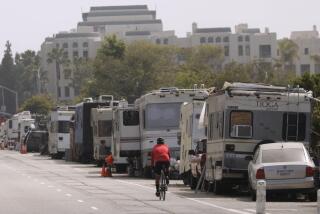A Thorny Problem : Stung by Rising Rent, Residents Seek to Buy Mobile Parks
Among the residents of Sierra Mobile Homes Estates in Huntington Beach, Gerie Kirkpatrick is known as the Rose Lady.
In front of the blue and white home Kirkpatrick and her husband bought in 1982, she cultivates 18 rosebushes that bloom in yellow, pink and white. Scissors hang from a small wooden sign hand-painted to read, âHelp yourself to a rose.â Her neighbors in the 230-home park often do so--and no one steals the scissors.
Kirkpatrick, now a widow and retired, owns her mobile home, but she doesnât own the rose garden. And because of escalating rental rates for spaces in the park, she says, keeping the home itself is becoming difficult. âWe thought we did such a smart thing when we moved in here, thinking it was a good, affordable place to retire,â Kirkpatrick said. âThen we were hit with rent increases. People are walking away from their trailers, and (the homes) are going back to the banks.â
The rent for Kirkpatrickâs space in Sierra Mobile Homes Estates has climbed to $488 a month from $220 six years ago, she said--in addition to her monthly payment of $429 on her home. Squeezed by such increases--which reflect rising property values in recent years--a growing number of Californiaâs mobile home dwellers-- estimated to number more than 1 million--say they are being forced out. As a result, many are taking advantage of state laws that encourage them to band together and buy the property on which their homes sit.
Besides gaining control of rental rates, residents who own their parks can set policies and regulations, pool their money to improve common areas and build equity they can cash in if they decide to sell their homes.
Local governments are also getting involved, especially in urban counties such as Orange and Los Angeles, to preserve mobile home parks as affordable housing for elderly people such as Kirkpatrick, who live on fixed incomes, and for young, lower-income families.
Californiaâs mobile home population has changed dramatically in the last 30 years. During the 1960s, most park residents were elderly people who bought the homes for as little as $15,000, often paid in cash from selling their conventional houses on retirement.
During the real estate boom of the 1980s, working families priced out of the housing market began moving into the parks. Driven by consumer demand, mobile home prices soared.
In the economic downturn and housing industry slump that followed, many of those working people lost their jobs. At the same time, the value of their mobile homes fell because of depreciation and the real estate decline. Homes bought for between $50,000 and $80,000 were bringing only $20,000 to $30,000 when resold, according to the Manufactured Housing Educational Trust, a trade group based in Orange County.
At the same time, rent for spaces in parks began increasing. Sites that rented for $250 a month in the mid-1980s now range as high as $1,000 in coastal areas. Space rents average about $500.
As early as 1986, the state had a program for making low-interest loans available to mobile home park residents. Of the estimated 4,000 parks in California, only about 120 have become resident-owned parks, known as ROPs. But interest in the idea is rising sharply, said John Tennyson, chief consultant to the state Senateâs Select Committee on Mobile Homes.
âRents are going to continue to go up,â said Tennyson, whose committee has published a pamphlet titled âGuide to Mobilehome Park Purchases by Residents.â âThatâs the biggest issue driving the trend toward park ownership.â
An intergovernmental agency created by the California State Assn. of Counties and the League of California Cities is mailing out this month brochures about a new program called MuniHome.
Under that plan, the agency, which has sold various types of bonds since the 1980s, will offer tax-exempt revenue bonds for cities, counties or nonprofit groups-- such as mobile home residents--who can then use the proceeds to buy the parks. New York investment bank Lazard Freres & Co. has been chosen to sell the bonds, which will be paid off out of park operating revenues.
âWe want to help cities and counties who are interested in preserving existing low-income housing stock,â said Dan Harrison, assistant director with the cities league in Sacramento. âItâs a tough decision for a city or county to acquire a mobile home park. Weâre not saying they should, but if they make that decision, we want to help them do it well.â
Beyond seeking to ensure a supply of affordable housing, some local governments are getting into the mobile home park market since being drawn into disputes between park owners and tenants.
In Ventura County, which has 23,136 mobile home residents, the Santa Paula City Council was besieged two years ago by angry tenants complaining that park landlords were gouging them on rent. The cityâs voters subsequently passed a measure tightening rent control laws already in effect, but the owner of one mobile home park sued the city, alleging that the new regulations interfered with his ability to make a profit.
James Taylor, owner of Santa Paula West Mobilehome Park, withdrew his lawsuit and eventually agreed to sell the property to residents for $9.2 million. The city has agreed to supply housing redevelopment bond money, but the purchase has been held up by financial delays.
Interest by a municipality or resident group in buying a park does not guarantee a done deal. Some park owners are not interested in selling.
Gene Pica, an owner of Sierra Mobile Home Estates, said the Huntington Beach property is profitable and âour rents are right where they should be. Weâre just a mile and a half from the ocean.â
âIf we do sell, weâll give them first choice,â Pica said of the parkâs residents, who have formed a nonprofit group called Sierra Residents Corp. State law, in fact, requires park owners to notify residents before putting the property up for sale.
But for now, Pica said, âweâre just not selling.â
Other park owners complain that tenant groups who want to buy them out are either poorly organized or cannot obtain financing.
âThe ideal buyer is the tenant,â said Richard Hall, a Costa Mesa businessman who is a part owner of Orange Countyâs largest mobile home park, the 29-acre Treasure Island Mobile Home Park on the oceanfront at Laguna Beach. âBut they donât have their act together.â
In Los Angeles County, which has 105,000 mobile home dwellers, the city of Lancaster has used redevelopment funds to purchase two parks and is negotiating to buy several more of the 33 parks within the city limits.
Several deals have been completed in recent months by nonprofit resident groups. In December, for example, the 268 dwellers at Bayside Village Mobile Home Park in Newport Beach purchased a 279-slip marina and the 56 acres under their homes from Irvine Co. for $12 million.
Industry consultants and even park owners foresee an increasing number of the stateâs mobile home communities being run as nonprofit operations.
âThe whole status of mobile home parks in California is going to change in the next decade, with most of them becoming owned by tenants and cities,â said Laguna Beach park owner Hall. âThirty years ago, it was a good idea to buy your mobile home and set it up on someone elseâs land. Thatâs not true today.â
Indeed, though the term mobile home suggests otherwise, owners cannot simply move to a new park where rents are lower, lawyer Gibbs said.
âThe industry has changed since 1955--itâs not Lucille Ball and Desi Arnaz hooking up their trailer to their car,â he said. âThese things donât move today.â
Living Mobile
According to the 1990 census, only 1.8% of Los Angeles Countyâs population lived in mobile homes, the lowest figure in Southern California. In inland counties, the rate was much higher. Riverside had the most in Southern California, at 15.4%.
Mobile home Percent of County population total population Los Angeles 104,985 1.8% Orange 53,019 3.6% Riverside 131,338 15.4% San Bernardino 76,829 7.9% Ventura 23,136 5.3% San Diego 83,132 4.9%
More to Read
Sign up for Essential California
The most important California stories and recommendations in your inbox every morning.
You may occasionally receive promotional content from the Los Angeles Times.










